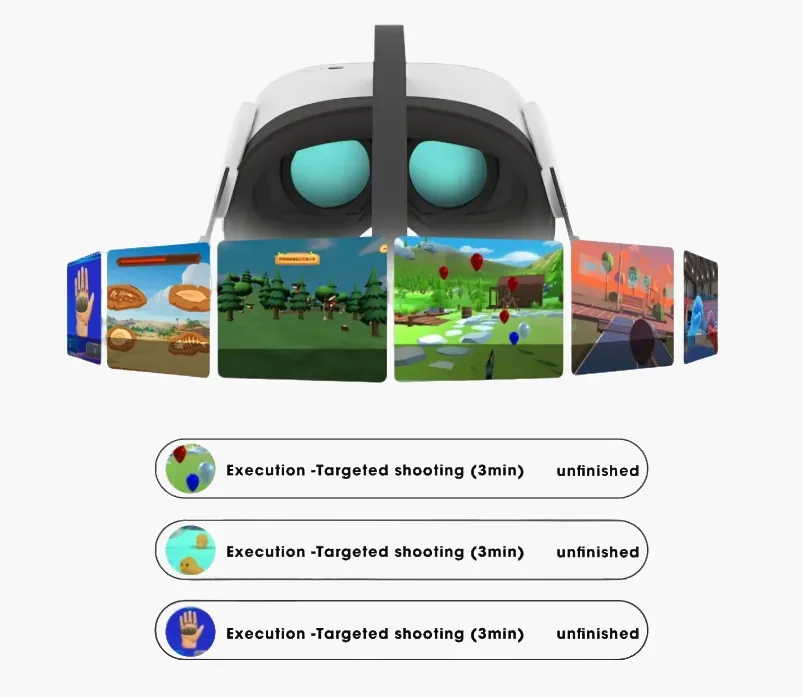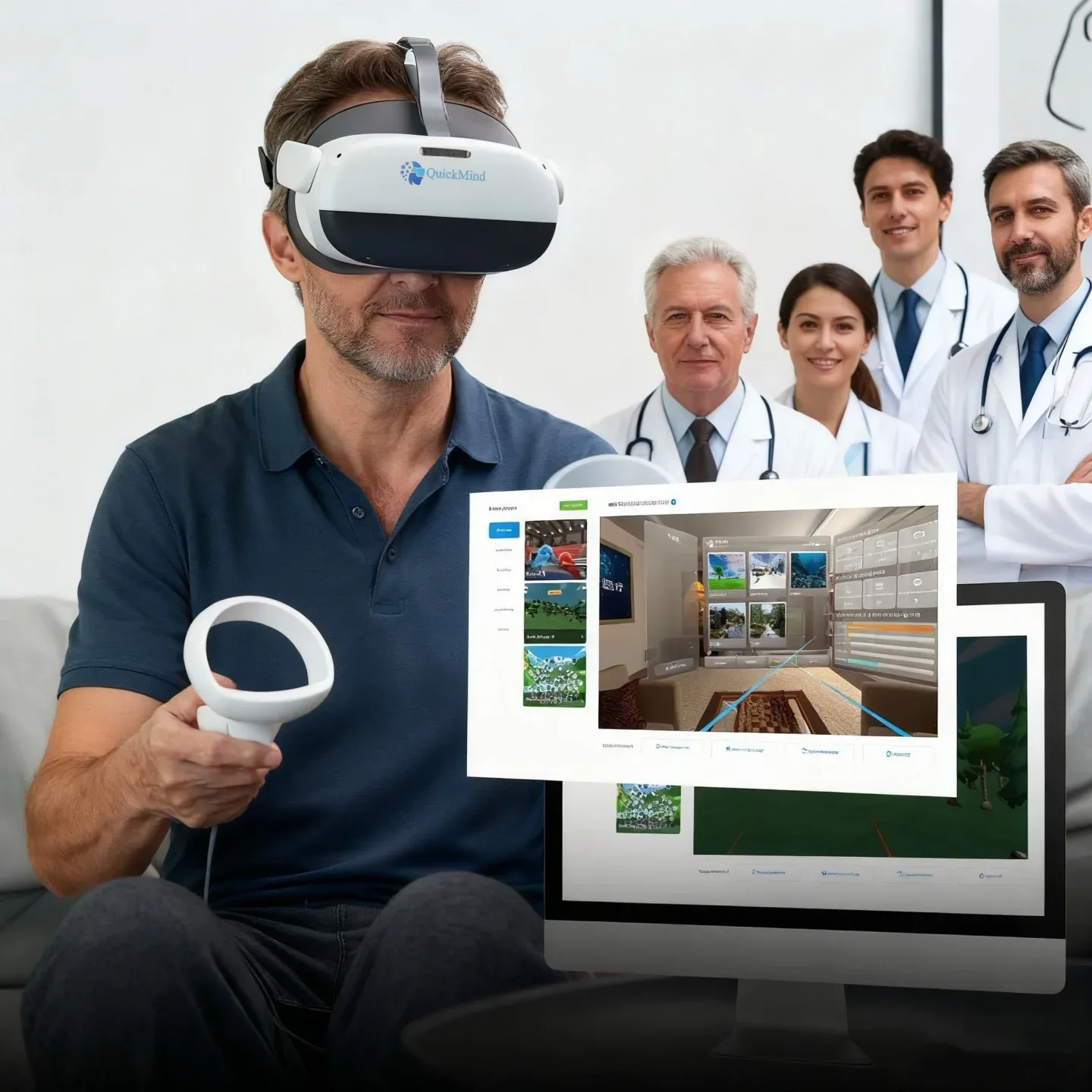
Expanding examinations proposes that Virtual Reality strategy can noticeably improve the quality of clients diagnosed with brain function deterioration. By transporting them to peaceful settings, VR grants a original chance for neural stimulation, feelings management, and socialization. Multiple analyses have revealed that VR therapy can minimize distress, anxiety, and misery in dementia patients while also augmenting their cognition, awareness, and social skills.
- VR allows patients with dementia to revisit precious moments through collaborative emulations.
- Moreover, it can yield a harmless and empathetic space for social engagement, fostering a notion of union and adherence.
- Clinicians conclude that VR therapy has the potential to innovate dementia assistance by yielding new and creative means to deal with the hard concerns faced by subjects experiencing this malady.
Advanced Digital Care for Cognitive Support in Alzheimer's
Progressive electronic therapeutics are showing promise in the territory of memory advancement for clients affected by Alzheimer syndrome. These technologies capitalize on technical resources to strengthen brain capability and potentially retard the advancement of the malady. Fun-packed workouts, personalized support, and cognitive training are some representations of procedures being explored in this growing discipline. While research are underway, digital therapeutics provide a additional roadway for strengthening the experiences of those affected by Alzheimer's disease.Novel VR Techniques for Alzheimer's Intervention
Regarding users dealing with Alzheimer's dementia, the incremental deterioration of recall and psychological faculties can severely reduce their power to connect with the immediate surroundings. This debilitating syndrome often brings about in remoteness, upset, and a limited self-perception. Current improvements in virtual reality technology bring a trailblazing option to handle these problems by developing immersive realities that can trigger the brain and invigorate cognitive function.
Simulated reality settings designed specifically for persons with Alzheimer's can take them in acquainted locations, such as their youthful dwelling or a favorite park, reminiscing positive memories and mitigating anxiety. Through interactive endeavors, these virtual scapes can also engage cognitive abilities like mind retention, awareness, and analytical skills.
The beneficial impacts of virtual reality in Alzheimer's support are vast. Early examinations have disclosed constructive results, with patients exhibiting improvements in cognitive skills, mood, and overall quality of life. As this system progresses, it holds the key to transforming the way we approach Alzheimer's disease, granting a new pathway for help and strengthening.
Virtual Memory Therapy for Alzheimer's Clients
Reminiscence therapy is an established technique used to improve cognitive function and psychosocial health in individuals with Alzheimer's disease. This classic form of therapy involves prompting patients to share past experiences, often through discussion. However, a groundbreaking approach is emerging: VR-mediated reminiscence therapy.
This immersive technology utilizes virtual reality headsets to transfer patients in virtualized environments that evoke memories from their past. By participating these man-made contexts, individuals with Alzheimer's can connect with their past in a powerful way.
VR-Based Approaches for Memory and Cognitive Enhancement in Dementia
Virtual reality (VR) is emerging as a prospective resource in the fight against dementia, granting modern ways to invigorate memory and cognition. By generating immersive environments, VR can help individuals with dementia retrieve memories, take part in meaningful activities, and enhance cognitive capacities. Studies have established that VR interventions can produce substantial improvements in memory recall, attention, and navigational awareness. Moreover, VR provides a risk-free and motivating space for individuals with dementia to explore, reducing feelings of isolation and concern.
- Furthermore, VR can be personalized to individual needs and preferences, permitting enhanced levels of collaboration.
- Regardless of the potential of VR, ongoing research is needed to fully understand its long-term results in dementia care.
Rekindling Memories, Rebuilding Connections: VR's Impact on Social Engagement in Alzheimer's Disease
Virtual synthetic settings is emerging as a state-of-the-art mechanism in the discipline of dementia care. By simulating engaging and participative worlds, VR has the ability to stimulate memories, promote social interaction, and advance the overall quality of life for participants coping with Alzheimer's. Prominently an remarkable aspects of VR is its ability to transfer users to recognizable places and encounters from their past. Whether it's a excursion in a childhood home or a model of a beloved holiday, these virtual explorations can trigger happy memories and strengthen cognitive performance. Furthermore, VR can enable social interaction by associating individuals with others who share similar memories. This can be particularly useful for people with Alzheimer's who may struggle with traditional social contact. By offering a safe and absorbing virtual space, VR can alleviate feelings of isolation and loneliness, which are common among users diagnosed with Alzheimer's. Overall, VR holds immense prospect for improving the lives of digital therapy individuals with Alzheimer's by reviving memories, repairing connections, and refining their quality of life. As technology keeps on expand, we can expect even more advanced applications of VR in the field of dementia care.Incorporating Cognitive Training: Employing VR Tools for Alzheimer's Care
Immersive reality systems is rapidly emerging as a game-changing tool in the realm of cognitive training, particularly for patients affected by Alzheimer's disease. By immersing patients in interactive and engaging virtual environments, VR-based interventions can enhance cognitive functions such as memory, attention, and problem-solving. These games often incorporate elements of storytelling, exploration, and social interaction, making the training process increasingly entertaining. Studies have shown that VR-based cognitive training can lead to important improvements in cognitive performance, possibly delaying the progression of Alzheimer's symptoms. Moreover, VR provides a safe and controlled environment for patients to practice new skills and improve their confidence.
- Play-based techniques in VR training can make it very enjoyable and involving for individuals with cognitive impairments.
- VR simulations can offer lifelike scenarios that encourage and raise cognitive functions.
- Personalized VR experiences can cater to individual needs and learning styles.
Virtual Reality: New Horizons in Dementia Assistance
Mesmerizing virtual reality offer a original and encouraging avenue for individuals living with dementia. These tools can develop familiar environments, allowing those affected by cognitive decline to engage with cherished memories and develop a sense of contentment. By mitigating the issues of dementia, VR platforms have the ability to boost quality of life for both individuals and their caregivers.
- Studies indicate that VR methods can positively impact cognitive function, mental well-being, and even motor abilities in individuals with dementia.
- Moreover, VR affords a safe and regulated environment for investigation, reducing the risk of discomfort.
- Likewise, VR can strengthen social contacts by allowing individuals with dementia to collaborate in cyber activities with others.
Virtual Reality for Prompt Alzheimer's Screening and Intervention
Alzheimer's dementia exhibits a multifaceted obstacle, often going undetected in its early stages. However, virtual reality (VR) is unfolding as a state-of-the-art tool for screening for Alzheimer's. Through immersive simulations, VR can analyze cognitive performance in ways that traditional methods struggle to. This possibility allows for prompt management strategies, potentially impeding disease progression and optimizing the quality of life for individuals with Alzheimer's.
- VR-based assessments can test memory, attention, and spatial awareness in a safe and controlled setting.
- Personalized VR experiences can help patients participate in activities that stimulate cognitive function.
- Virtual environments can provide a supportive and engaging platform for individuals with Alzheimer's to socialize.
Connecting Dementia Patients: VR's Role in Communication and Interaction Enhancement
{In the realm of dementia care, innovative technologies are emerging to enhance the lives of subjects facing dementia challenges. Virtual reality (VR) is one such mechanism that holds immense prospect for strengthening interaction and communication for dementia sufferers via VR. By simulating captivating interactive virtual spaces, VR can activate cognitive function, reduce behavioral issues, and ultimately improve the overall well-being of clients affected by dementia.
VR experiences aligned with dementia treatment goals can range from recollection therapy sessions that immerse patients in recognizable historic moments, to interactive games that promote social interaction and cognitive engagement. Furthermore, VR has the power to connect users experiencing dementia with caregivers, regardless of physical barriers, fostering a sense of community.
- VR can help in reducing agitation and anxiety by providing a calming and distracting environment.
- Analyses have shown that VR interventions can lead to improvements in cognitive function, mood, and social interaction in participants with dementia.
- As technology develops in evolve, we can expect even more innovative and {effective|beneficial|helpful|powerful|impactful|successful|productive|efficient
